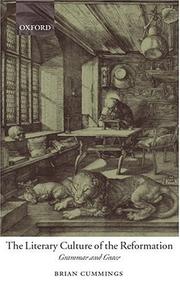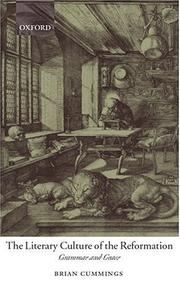| Listing 1 - 10 of 18 | << page >> |
Sort by
|

ISBN: 0198187351 0191674702 019151862X 0199226334 1281346101 9780199226337 Year: 2002 Publisher: Oxford Oxford University Press
Abstract | Keywords | Export | Availability | Bookmark
 Loading...
Loading...Choose an application
- Reference Manager
- EndNote
- RefWorks (Direct export to RefWorks)
Christian literature, English --- English language --- English literature --- Protestantism and literature --- Protestantism in literature. --- Reformation --- History and criticism. --- Grammar. --- Protestant authors --- History --- Protestantism in literature --- Protestantisme dans la littérature --- Protestantisme in de literatuur --- Erasmus, Desiderius --- Influence --- Luther, Martin --- Early modern, 1500-1700 --- History and criticism --- Christian literature [English ] --- 16th century --- 17th century --- Grammar --- England --- English literature - Early modern, 1500-1700 - History and criticism --- Religious literature, English - Early modern, 1500-1700 - History and criticism --- Religion in literature --- Reformation in literature --- Reformation - England --- Religion and literature --- Protestantism and literature - History - 16th century --- Protestantism and literature - History - 17th century --- English language - Early modern, 1500-1700 - Grammar --- Erasmus, Desiderius, - -1536 - Influence --- Luther, Martin, - 1483-1546 - Influence --- Religious literature, English --- Erasmus, Desiderius, - -1536 --- Luther, Martin, - 1483-1546

ISBN: 9780198187356 9780199226337 0199226334 Year: 2009 Publisher: Oxford: Oxford university press,
Abstract | Keywords | Export | Availability | Bookmark
 Loading...
Loading...Choose an application
- Reference Manager
- EndNote
- RefWorks (Direct export to RefWorks)
820 "15/16" --- 284.1*15 --- 284.1*15 Culturele gevolgen van de reformatie --- Culturele gevolgen van de reformatie --- 820 "15/16" Engelse literatuur--?"15/16" --- Engelse literatuur--?"15/16" --- English literature --- Religious literature, English --- Religion in literature --- Reformation in literature --- Reformation --- Religion and literature --- Protestantism and literature --- English language --- Protestantism in literature --- History and criticism --- History --- Grammar --- Erasmus, Desiderius, --- Luther, Martin, --- Influence --- Literature --- anno 1500-1599 --- anno 1600-1699 --- Thematology --- Erasmus, Desiderius, - -1536 --- Luther, Martin, - 1483-1546
Book
ISBN: 9780199677719 0199677719 0191778605 0198831188 1299924190 0191665398 9780191665394 9780191778605 Year: 2013 Publisher: Oxford: Oxford university press,
Abstract | Keywords | Export | Availability | Bookmark
 Loading...
Loading...Choose an application
- Reference Manager
- EndNote
- RefWorks (Direct export to RefWorks)
'Mortal Thoughts' is a study of the question of human identity in the early modern period. It examines literature alongside emerging forms of life writing and life drawing and self-portraits and considers portrayals of mortality and the moment of death.
Identity (Psychology) --- Identity (Psychology) in literature --- History --- Religious aspects --- Christianity --- Shakespeare, William, --- Criticism and interpretation --- Identity (Psychology) in literature. --- Personal identity --- Personality --- Self --- Ego (Psychology) --- Individuality --- Christianity. --- Shakespeare, William --- Shakespear, William, --- Shakspeare, William, --- Šekʻspiri, Uiliam, --- Saixpēr, Gouilliam, --- Shakspere, William, --- Shikisbīr, Wilyam, --- Szekspir, Wiliam, --- Šekspyras, --- Shekspir, Vilʹi︠a︡m, --- Šekspir, Viljem, --- Tsikinya-chaka, --- Sha-shih-pi-ya, --- Shashibiya, --- Sheḳspir, Ṿilyam, --- Shaḳspir, Ṿilyam, --- Syeiksŭpʻio, --- Shekspir, V. --- Szekspir, William, --- Shakespeare, Guglielmo, --- Shake-speare, William, --- Sha-ō, --- Şekspir, --- Shekspir, Uiliam, --- Shekspir, U. --- Šekspir, Vilijam, --- Ṣēkspiyar, Viliyam, --- Shakspir, --- Shekspyr, Vyli︠e︡m, --- Şekspir, Velyam, --- Ṣēkspiyar, Villiyam, --- Shēkʻspʻiyr, Vlilliam, --- Ṣēkspiyar, --- Ṣēkspiyar Mahākavi, --- Ṣēkspiyar Mahākaviya, --- Sheḳspier, Ṿilyam, --- Shēkʻspir, --- Shakespeare, --- Śeksper, --- Шекспир, Вильям, --- Шекспир, Уильям, --- שייקספיר, וויליאם, --- שייקספיר, וו., --- שיקספיר, וויליאם --- שיקספיר, ויליאם --- שיקספיר, ויליאם, --- שכספיר, ויליאם, --- שכספיר, וילים, --- שכספיר, ו׳ --- שעפקספיר, וויליאם, --- שעקספיער, וויליאם --- שעקספיער, וויליאם, --- שעקספיער, ווילליאם --- שעקספיער, וו., --- שעקספיר --- שעקספיר, וו --- שעקספיר, וויליאם, --- שעקספיר, וויליאמ --- שעקספיר, ווילליאם --- שעקספיר, ווילליאם, --- שעקספיר, וו., --- שעקספיר, װיליאם, --- שעקספיר, װילליאם, --- שעקספיר, װ., --- שעקספער --- שעקספער, וויליאמ --- שקספיר --- שקספיר, וו --- שקספיר, וויליאם --- שקספיר, וויליאם, --- שקספיר, ווילים, --- שקספיר, וילאם --- שקספיר, ויליאם --- שקספיר, ויליאם, --- שקספיר, ויליים, --- שקספיר, וילים --- שקספיר, וילים, --- شاكسبير، وليم --- شاكسپير، وليم --- شكسبير، وليام --- شكسبير، وليم --- شكسبير، وليم، --- شكسبير، و. --- شكسپير، وليم --- شكسپير، ويليام --- شيكسبير، وليام --- شيكسبير، وليام.، --- شيكسبير، وليم --- شکسبير، وليم --- وليم شکسبير --- 沙士北亞威廉姆, --- 沙士比亞威廉姆, --- 莎士比亞威廉姆, --- 莎士比亞威廉, --- 莎士比亞, --- Criticism and interpretation. --- Identity (Psychology) - England - History - 16th century --- Identity (Psychology) - England - History - 17th century --- Identity (Psychology) - Religious aspects - Christianity --- Shakespeare, William, - 1564-1616 - Criticism and interpretation --- Shakespeare, William, - 1564-1616
Book
ISBN: 9780199207176 Year: 2011 Publisher: Oxford Oxford university press
Abstract | Keywords | Export | Availability | Bookmark
 Loading...
Loading...Choose an application
- Reference Manager
- EndNote
- RefWorks (Direct export to RefWorks)
Digital
ISBN: 9781108900157 Year: 2020 Publisher: Cambridge Cambridge University Press
Abstract | Keywords | Export | Availability | Bookmark
 Loading...
Loading...Choose an application
- Reference Manager
- EndNote
- RefWorks (Direct export to RefWorks)
Book
ISBN: 9781472413642 9781315599625 9781317083450 9781317083467 9781138245877 1138245879 1472413644 1315599627 1317083466 1317083474 1472413652 Year: 2013 Publisher: Farnham: Ashgate,
Abstract | Keywords | Export | Availability | Bookmark
 Loading...
Loading...Choose an application
- Reference Manager
- EndNote
- RefWorks (Direct export to RefWorks)
Framed within a wide range of ideas, including politics and religion, this volume makes new connections between embodiment, selfhood and the passions. It explores new ways of negotiating the boundaries between a cognitive and bodily approach to emotion, and in the process suggests both new models of the self and new models for interactive and inter-disciplinary history.
English literature --- Thematology --- Psychological study of literature --- anno 1600-1699 --- anno 1500-1599 --- Subjectivity in literature --- Self in literature --- Emotions in literature --- Popular culture and literature --- Literature --- History and criticism --- Philosophy --- History --- Literature and popular culture --- Philosophy&delete& --- Belles-lettres --- Western literature (Western countries) --- World literature --- Philology --- Authors --- Authorship --- Subjectivity in literature. --- Self in literature. --- Emotions in literature. --- History and criticism. --- History.
Book
ISBN: 1317083466 1472413652 9781472413659 9781306169752 1306169755 1472413644 9781472413642 9781472413642 9781472413666 1138245879 1315599627 1317083474 1472413660 9781317083467 Year: 2013 Publisher: Burlington, VT
Abstract | Keywords | Export | Availability | Bookmark
 Loading...
Loading...Choose an application
- Reference Manager
- EndNote
- RefWorks (Direct export to RefWorks)
Framed within a wide range of ideas, including politics and religion, this volume makes new connections between embodiment, selfhood and the passions. It explores new ways of negotiating the boundaries between a cognitive and bodily approach to emotion, and in the process suggests both new models of the self and new models for interactive and inter-disciplinary history.
English literature --- Subjectivity in literature. --- Self in literature. --- Emotions in literature. --- Popular culture and literature --- Literature --- Belles-lettres --- Western literature (Western countries) --- World literature --- Philology --- Authors --- Authorship --- Literature and popular culture --- History and criticism. --- Philosophy --- History. --- English literature - Early modern, 1500-1700 - History and criticism --- Subjectivity in literature --- Self in literature --- Emotions in literature --- Popular culture and literature - England --- Literature - Philosophy - History
Book
ISBN: 0191792144 0191549754 9780191549755 9780191792144 9780199212484 0199212481 0198724470 Year: 2012 Publisher: Oxford: Oxford university press,
Abstract | Keywords | Export | Availability | Bookmark
 Loading...
Loading...Choose an application
- Reference Manager
- EndNote
- RefWorks (Direct export to RefWorks)
The deepest periodic division in English literary history has been between the medieval and the early modern. 'Cultural Reformations' initiates discussion on many fronts in which both periods look different in dialogue with each other.
English literature --- History and criticism. --- Periodization. --- History and criticism --- Periodization --- Literature --- History of civilization --- English literature - Middle English, 1100-1500 - History and criticism --- English literature - Early modern, 1500-1700 - History and criticism --- English literature - Periodization
Book
ISBN: 9780192847317 0192663089 9780192663085 0192847317 Year: 2022 Publisher: Oxford Oxford University Press
Abstract | Keywords | Export | Availability | Bookmark
 Loading...
Loading...Choose an application
- Reference Manager
- EndNote
- RefWorks (Direct export to RefWorks)
"Bibliophobia is a personal meditation on the 5000-year history of writing and of books, from the perspective of the smartphone. Its starting point is the contemporary idea of "the death of the book", embodied not only in the replacement of the physical book by digital media, but in the accompanying twenty-first century experience of paranoia and of literary apocalypse. It traces a twin fear of omniscience and oblivion right back to the origins of writing in ancient Sumeria and Egypt, and then forwards to the age of Google. It covers examples of bibliophobia from the first Chinese emperor to Nazi Germany, alongside a parallel story of bibliomania and bibliolatry within world religions and literatures. Using examples from six continents, it discusses topics such as the origins and decipherment of different kinds of human script; the development of textual media such as scrolls, codices, printed books, and artificial intelligence; the collection and destruction of libraries; the use of books as holy objects, talismans, and shrines; and the history of slavery, heresy, blasphemy, censorship and persecution. Originating as the Clarendon Lectures in the Faculty of English at the University of Oxford, the methods of Bibliophobia range across book history; comparative religion; philosophy from Plato to Hegel and Freud; and a wide range of global literature from ancient to contemporary. Richly illustrated with manuscripts, printed objects, and art works, at its heart is the power that books always (and continue to) have in the emotional, spiritual, bodily, and imaginative life of readers"--
Book history --- Books --- History
Book
ISBN: 0199645205 9780199645206 Year: 2013 Publisher: Oxford: Oxford university press,
Abstract | Keywords | Export | Availability | Bookmark
 Loading...
Loading...Choose an application
- Reference Manager
- EndNote
- RefWorks (Direct export to RefWorks)
The words of the Book of Common Prayer have permeated deep into the English language all over the world. For nearly 500 years, and for countless people, it has provided a background fanfare for a marriage or a funeral march at a burial. Yet this familiarity also hides a violent and controversial history. When it was first produced the Book of Common Prayer provoked riots and rebellion, and it was banned before being translated into a host of global languages and adopted as the basis for worship in the USA and elsewhere to the present day. This edition presents the work in three different states: the first edition of 1549, which brought the Reformation into people's homes; the Elizabethan prayer book of 1559, familiar to Shakespeare and Milton; and the edition of 1662, which embodies the religious temper of the nation down to modern times.
| Listing 1 - 10 of 18 | << page >> |
Sort by
|

 Search
Search Feedback
Feedback About UniCat
About UniCat  Help
Help News
News